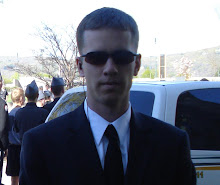
Monday, this man was here to talk to the cadets enrolled in MX400: Officership. This guy is General (retired) David McKiernan who was in the news most recently for being fired. Yeah, not usually the way that a four-star general likes to go out. It wasn't as if he did terrible things (he definitely didn't), but when President Obama took office he wanted some fresh blood in charge of the coalition in Afghanistan, and he turned to Gen. Stan McCrystal (who in my opinion has been doing a fabulous job by the way). General McKiernan has had a very distinguished career and has commanded at every level in the army, so it was an honor and privilege to hear him speak. It's always interesting to hear different peoples' leadership philosophies, so I'll share with you some of the things he told us and my reactions.
He started by saying that "leadership is not rocket science" which was interesting I thought. So much of what we do here is trying to figure out how to be the best possible leader, but it would seem as if maybe it isn't all that hard. You really only need to have a few well-established and noble guiding principles to live by, and leadership should come somewhat naturally. Or so the argument can be made. General McKiernan's guiding principles are: competency, commitment, courage, candor, consistency, patience, listening, and empathy. I would say that his points were fairly unique; I'm not sure I've ever heard too many higher level leaders claim that empathy was one of their guiding principles. But General McKiernan did what I think all general officers do: he got up in front of us and said something along the lines of "now I can't completely define leadership or claim to have the answers for you and it's pointless to try" but then goes ahead and tells us a whole bunch of things that we should try and emulate about his own career. It certainly has merit and I'm not faulting him for it, but it gets old sometimes.
He then shared some of his lessons learned (these are verbatim from his slideshow):
1) bad things happen in war - keep your emotions in check
2) change is the one constant in life...thrive in dealing with change...complacency kills
3) people are generally good, very few soldiers screw up on purpose
4) common sense matters
5) micromanagement is bad...but don't confuse with need to check/inspect
6) the "book" (policy/regulation) is a guide
7) soldiers' personal lives matter...everyone has stress
8) the world is generally not black & white - lots of grayness out there
9) life is short - enjoy it/stay positive
10) don't take yourself too seriously - if you can't take a joke, leave
11) ultimately you fight for your comrades
12) only individuals and small units win our battles!
Two points that require a little expansion are 6 and 11. He says that policy and regulations are a guide, and I originally took that to meant that he was a big fan of policy and regulation, that they should always be your guide. Such is not the case though. Policy and regulation are important, but they are a guide in the sense that they only go so far and a good leader has to be willing to and comfortable with leaving the regulations behind when the situation dictates it. Creativity trumps SOP (standard operating procedure) many days of the week. The second point I thought was interesting was that you ultimately fight for your comrades. This is something you hear a lot, that at the end of the day soldiers care for nothing more than their battle buddies. At first I was like "shouldn't you be fighting for a higher purpose at the end of the day?" but then I got to thinking that it is at the beginning of the day you are fighting for the higher-order stuff like your country, the Afghan or Iraqi or people, etc. When the bullets start flying, it is absolutely true that the only reason a soldier fights is for his friend to the left and to the right of him.
There was some question and answer, but no one asked him (understandably) about the circumstances around him getting fired from commanding ISAF. Someone asked him whether we should be supporting a national government in Afghanistan because of it's tribal nature. The answer was that yes we should, but that we should also be devoting significant attention to strengthening the tribes in order to protect against the Talliban, Al Queda, or whoever is currently trying to seize power around the country. Another question posed was how do you tell the difference between an acceptable and unacceptable mistake, and I thought that this was an interesting philosophical question that you could probably write a book about. General McKiernan talked about how matters of morals and values can be unacceptable mistakes. There may be situations where people make mistakes and innocent people die, but they are possibly acceptable (and probably acceptable given the professionalism of our soldiers) depending on the circumstances.
Does anyone out there have an opinion about the difference between acceptable and unacceptable mistakes? I'm not so sure there is a such thing as an unacceptable mistake...

4) common sense matters
ReplyDeleteThat's my favorite. It's also probably the hardest to remember.
our one chaplain here also has good advice Sarah: 1) say your prayers 2) don't do stupid stuff and 3) trust in God.
ReplyDeleteGuess which one of those is my favorite.